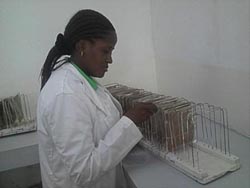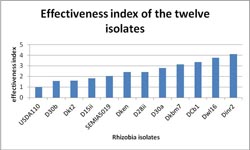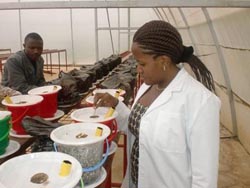| My name is Bintu Ndusha, I am a Congolese student at University of Nairobi with my studies funded by the N2Africa project. I am currently doing my research on my project in Rhizobiology titled "Effectiveness of Rhizobia strains isolated from South Kivu soils in nodulation of Soyabean (Glycine max)". The project involves collection and isolation of rhizobia strains available in South Kivu soils, screening them for effectiveness in the greenhouse and in the field, comparing them to available commercial strains (USDA110 and SEMIA5019) and evaluating their effectiveness on two varieties of soyabean (a promiscuous and a specific variety). The aim is to obtain elites strains for inoculation of soyabean. |
Planting in the greenhouse |
The first step of my work, collection and isolation of Rhizobia strains across different ecologies in South Kivu, has been completed. A total of 107 rhizobial isolates were isolated and characterized by BTB and Congo red reaction. The strains were then authenticated as rhizobia by plant infection method. Thereafter, the isolates were screened in the greenhouse, first in sterile sand in adapted Leonard’s jars. The effectiveness index was calculated by dividing the shoot weight by shoot weight of USDA110 or nodules weight of considered strains by nodules weight of USDA110. In this experiment, a highly significant difference between strains was observed. Ten percent of the isolates was highly effective compared to the commercial strain USDA110 and was selected for testing in potted field soils in the greenhouse. Soils from two sites were selected and two varieties were used. The total N of these soils was predetermined and MPN performed.
 |
 |
Photo left: Determining the rhizobia population in the soils using MPN method continues Table: Effectiveness index of the ten selected isolates compared to the commercial isolates based on nodules weight |
The experiment is ongoing under the mentorship of Prof. Nancy Karanja, Prof. Jean Walangululu, Dr. Paul Woomer and Dr. Freddy Baijukya.
Bintu Ndusha

